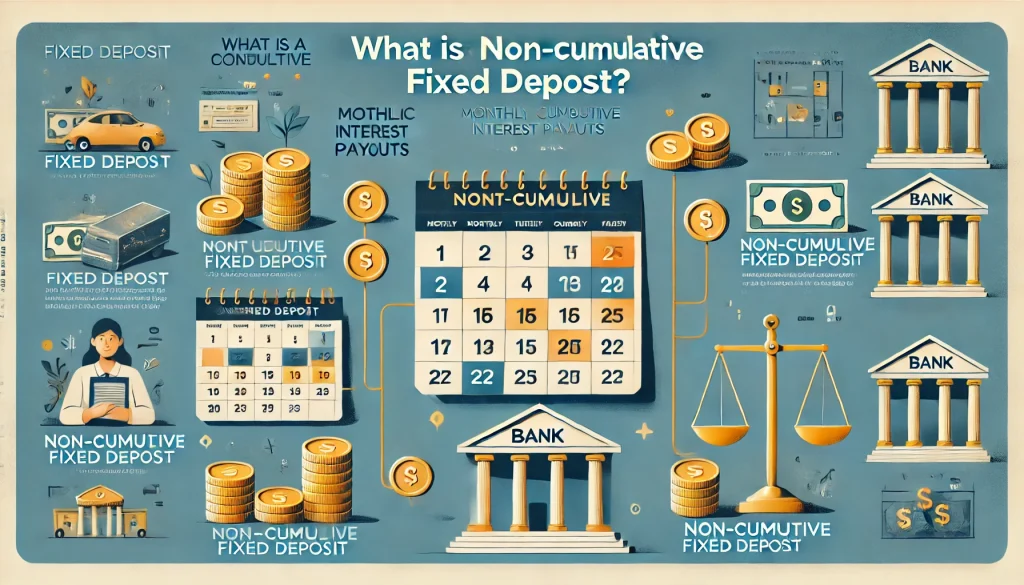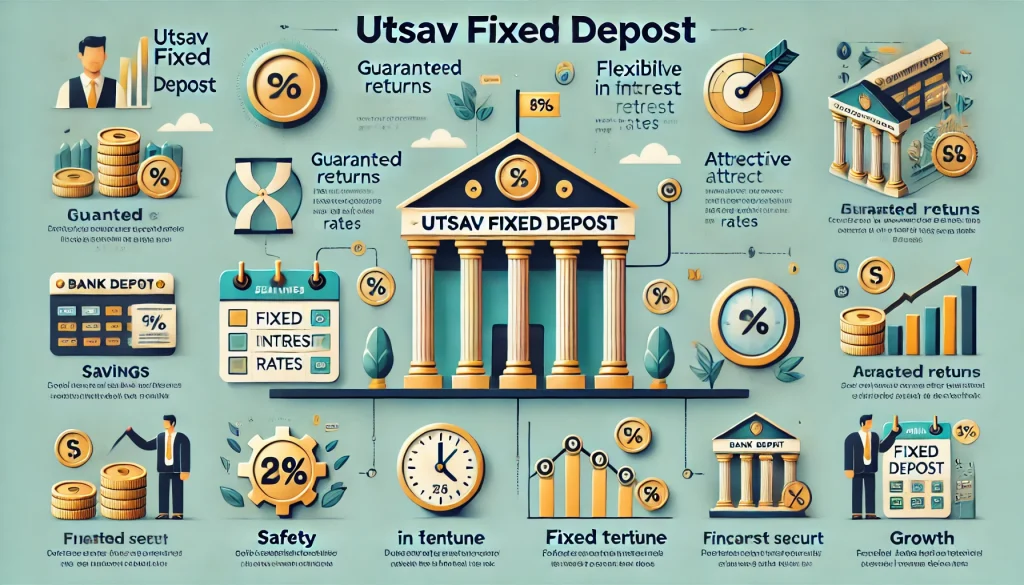
A popular investment option for risk-averse individuals, fixed deposit accounts are available in different forms, each providing unique features and benefits. This blog will discuss the different types of fixed deposit accounts offered by banks and other financial institutions in India and guide you on how to choose the best among all.
What are the Types of Fixed Deposit Accounts?
Here is a list of different fixed deposit accounts you can avail
- Standard/Regular Fixed Deposit
- Senior Citizen Fixed Deposit
- Tax-saving Fixed Deposit
- Corporate Fixed Deposit
- Flexi Fixed Deposit
- Cumulative Fixed Deposit
- Non-cumulative Fixed Deposit
- NRE Fixed Deposit
1. Standard/Regular Fixed Deposit
A standard fixed deposit is the most popular and commonly offered FD in most Indian banks and financial institutions. Under this account, a sum of money is invested for a tenure which is predetermined by an investor, generating returns higher than a savings account. This type of FD applies to all Indian residents, including minors and senior citizens.
| Tenure | 7 days to 10 years |
| Minimum & Maximum Amount | Minimum Amount: ₹1,000 Maximum Amount: No limit |
| Interest Rate | 3.00% to 7.50% |
| Eligibility | Indian Residents, Non-Resident Indians, Minors, Senior Citizens, Sole Proprietors, Partners, Companies, Societies and Clubs |
| Taxation | Subject to 10% of TDS (Tax Deducted at Source) if the interest income of regular citizens is more than ₹40,000 and if the interest income for senior citizens is more than ₹50,000 |
2. Senior Citizen Fixed Deposit
A senior citizen fixed deposit account offers an additional 0.50% interest over standard FD rates. It is a special FD account for residents above 60 years of age, offering tax deductions under Section 80C of the Income Tax Act. It is generally designed with multiple interest payout options, including monthly, quarterly, half-yearly, or yearly.
| Tenure | 7 days to 20 years |
| Minimum & Maximum Amount | Minimum Amount: ₹100 Maximum Amount: No limit |
| Interest Rate | 2.50% to 9.50% |
| Eligibility | Indian Residents above 60 years of age |
| Taxation | Subject to tax deductions of up to ₹50,000 under Section 80TTB of the Income-tax Act, 1961 |
3. Tax-saving Fixed Deposit
With a fixed tenure of 5 years, a tax-saving fixed deposit is another special FD offering tax exemptions under Section 80C of the Income Tax Act. By investing in this type of fixed deposit account, an eligible entity can reduce their taxable income of a financial year by ₹1.5 lakhs. It has almost the same features as a standard FD, while the only difference is that it has a fixed cap on the maximum deposit amount.
| Tenure | 5 years |
| Minimum & Maximum Amount | Minimum Amount: ₹1,000 Maximum Amount: ₹1.5 lakhs |
| Interest Rate | 5.5% to 7.75% |
| Eligibility | Indian Residents above 18 years of age and members of Hindu Undivided Families |
| Taxation | Subject to tax deductions of up to ₹1.5 lakhs under Section 80C of the Income Tax Act, 1961 |
4. Corporate Fixed Deposit
The corporate FD account is another notable addition to the list of different types of fixed deposit accounts. A corporate fixed deposit account can be opened only by a few selective corporate companies and NBFCs (Non-Banking Financial Corporations). Designed with a cumulative option, this FD accumulates funds of such companies through assured returns.
| Tenure | 12 to 60 months |
| Minimum & Maximum Amount | Minimum Amount: ₹5,000 Maximum Amount: No limit specified |
| Interest Rate | 6.75% to 8.18% |
| Eligibility | Individuals (Residents and Non-Resident Indians), Members of Hindu Undivided Family (HUF), Clubs, Corporations, Associations, Societies, Educational Institutions, Partnership, Companies and Cooperatives |
| Taxation | Subject to TDS (Tax Deducted at Source) if the interest income of a year is more than ₹5,000 |
5. Flexi Fixed Deposit
A Flexi FD scheme, also known as a traditional FD, provides high-yielding returns of a fixed deposit as well as flexible liquidity options of a savings account. Its features are a unique combination of savings and regular FD accounts. Moreover, it provides additional benefits such as an instant account opening process, sweep-in FD and auto-renewal facilities.
| Tenure | 7 days to 10 years |
| Minimum & Maximum Amount | Minimum Amount: ₹5,000 Maximum Amount: No limit specified |
| Interest Rate | 3.00% to 8.95% |
| Eligibility | Indian Residents, Minors under guardianship and Senior Citizens |
| Taxation | No tax benefits are allowed |
6. Cumulative Fixed Deposit
Under a cumulative fixed deposit account, the interest earned is accumulated and added to the principal amount until the end of the tenure. This type of FD account works on the compounding power concept, where the interest amount generates further returns. It is primarily suitable for investors not seeking to receive an earning from FD investment regularly.
| Tenure | 6 months to 5 years |
| Minimum & Maximum Amount | Minimum Amount: No limit specified Maximum Amount: No limit specified |
| Interest Rate | 5.30% to 7.80% |
| Eligibility | Salaried People, Partners and Sole Proprietors |
| Taxation | Subject to 10% of TDS (Tax Deducted at Source) if the interest income is more than ₹40,000 and ₹50,000 for regular and senior citizens respectively |
7. Non-cumulative Fixed Deposit
Unlike a cumulative FD, this fixed deposit account offers a regular interest payout option which an investor generally determines. Although a non-cumulative fixed deposit account uses the power of compounding to generate interest, it offers lesser returns as compared to a cumulative account. It is suitable for individuals seeking a regular income from their investments.
| Tenure | 6 months to 10 years |
| Minimum & Maximum Amount | Minimum Amount: No limit specified Maximum Amount: No limit specified |
| Interest Rate | 6.00% |
| Eligibility | Indian Residents, Sole Proprietors, Partnership Firms, Companies, Hindu Undivided Families (HUFs), Trusts, Associations, Societies and Clubs |
| Taxation | Subject to 10% of TDS (Tax Deducted at Source) if the interest income is more than ₹40,000 and ₹50,000 for regular and senior citizens respectively |
8. NRE Fixed Deposit
A (Non-resident External) NRE fixed deposit account allows NRIs to deposit their savings in foreign currency value and avail attractive tax-free returns. It offers full repatriation of an FD investment made from an Indian account. Moreover, investors of this FD scheme are allowed to transfer their deposits to other accounts if required.
| Tenure | 1 to 10 years |
| Minimum & Maximum Amount | Minimum Amount: ₹500Maximum Amount: No limit specified |
| Interest Rate | 6.10% to 7.75% |
| Eligibility | Non-Resident Indians and Persons of Indian Origin |
| Taxation | Not subject to taxation |
9. NRO Fixed Deposit
Non-resident Ordinary or NRO fixed deposit accounts can only be opened by NRIs who want to manage and earn returns on the funds earned in India. Unlike an NRE account, an FD investment made in this account is not fully repatriable and is further subject to taxation under the Income Tax Act of 1961. However, this account provides an opportunity for foreign individuals to apply for an FD investment with Indian citizens jointly.
| Tenure | 7 days to 10 years |
| Minimum & Maximum Amount | Minimum Amount: ₹1 lakh Maximum Amount: No limit specified |
| Interest Rate | 3.00% to 8.25% |
| Eligibility | Non-Resident Indians, Overseas Citizens of India and People of India Origin |
| Taxation | Subject to TDS (Tax Deducted at Source) of 30%, including a surcharge and cess |
How to Choose the Right FD for You?
Listed below are some of the tips that will help you to choose the right FD.
- Find out the latest interest rates applicable to different types of FD schemes and compare all such rates offered by different banks and financial institutions. By verifying and comparing all the applicable rates, you can opt for the highest one that suits you.
- Make sure to choose an FD scheme that has credible A-ratings from organisations such as ICRA or CRISIL. An FD scheme with higher ratings is considered a safer investment plan and is ideal for risk-averse investors.
- Invest in an FD scheme that has minimum penalties involved and is associated with flexible terms and conditions.
- Select a longer tenure for your FD investment. Most banks and financial institutions offer their highest interest rates when depositors choose the longest tenure.
- Prefer an FD scheme which is designed with a considerate number of compounding periods. The higher the power of compounding, the more will be the interest income earned from an FD investment.
Conclusion
Hopefully, this complete guide on the different types of fixed deposit accounts will help you find out and choose the best FD scheme that suits your financial requirements. Make sure to consider the above-mentioned tips before prioritising any type of FD investment. When it comes to your investment portfolio, it is in your best interest to make an informed decision.
FAQs
Generally, most banks and financial institutions charge a penalty, ranging between 0.5% and 1%, from depositors/investors for withdrawing their FD investment before maturity.
Yes, you can withdraw the amount of interest earned from an FD investment every month. Monthly withdrawals of interest are only available in case of non-cumulative fixed deposits.
Yes, you can withdraw the amount of interest earned from an FD investment every month. Monthly withdrawals of interest are only available in case of non-cumulative fixed deposits.
In case of a depositor’s death, the nominee can either withdraw the FD investment without penalty or continue the FD till the end of a tenure.
The cumulative fixed deposit account provides the highest returns among all available FD options since it involves the power of compounding.
You can simply use the online Fixed Deposit Calculator and enter the required information such as amount, tenure and interest rate. Once entered all the details, you will see the return displayed on the tool.
Disclaimer
This article is solely for educational purposes. Stable Money doesn't take any responsibility for the information or claims made in the blog.


